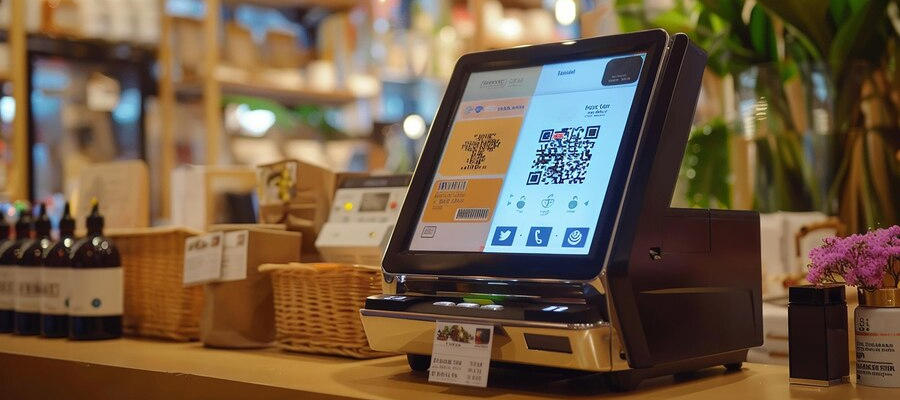
POS Systems and Business Automation
In the dynamic tapestry of modern commerce, the role of technology has evolved from a mere accessory to an indispensable cornerstone. The Point of Sale (POS) system, a digital monster that has completely changed how businesses run, is at the centre of this change. The idea of business automation stands out as a crucial component in comprehending the complexities of corporate operations. Let’s delve into the world of POS systems, exploring how they intertwine with automation to propel businesses forward.
Automated Business Systems explained
An essential component of modern firm management, automated business systems use technology to improve productivity, accelerate growth, and streamline operations. Businesses may reallocate human resources to strategic objectives, promoting innovation and agility, by automating monotonous processes. Every aspect of organizational operations, including customer relationship management (CRM) and supply chain management, is automated.
The Role of POS in Business
A POS system, at its core, is a digital platform that facilitates transactions at the point of sale. Its powers, however, go well beyond simple money processing. Sophisticated technologies like modern point-of-sale systems may have a big influence on a company's overall success. They gather priceless information on sales, inventory, client behaviour, and worker efficiency, acting as the hub of the organization. For companies looking to maximize their strategy and make well-informed decisions, this data is a treasure trove.
POS Automation Testing: A Cornerstone of Efficiency
To ensure seamless operations and accurate data, rigorous testing of POS systems is paramount. Automation testing for point-of-sale systems is a methodical way to assess system performance in different scenarios. Businesses may find and fix problems quickly, reducing downtime and improving customer satisfaction, by automating test cases. A thorough testing program is necessary to ensure the POS system's dependability and effectiveness.
Tools for POS Automation Testing
The choice of suitable tools is critical to the effectiveness of POS automation testing. There are several alternatives accessible, each with special advantages and skills. Business analysts are essential in determining which tools are most suited for a certain set of needs. Businesses may enhance test coverage, expedite time-to-market, and streamline the testing process by utilizing these technologies.
POS System for Small Business India
Small firms in the rapidly expanding Indian market are realizing the importance of technology in spurring expansion. A point-of-sale system designed with small businesses' unique requirements in mind may alter everything. Small business owners may ensure operational efficiency and concentrate on their core talents by automating processes like inventory management, sales monitoring, and customer relationship management.
POS and Business Automation
A strong synergy is produced when POS systems are integrated with larger corporate automation projects. Businesses may attain previously unattainable levels of efficiency by automating many facets of the sales process, ranging from order placing to payment processing. Additionally, the information produced by point-of-sale (POS) systems may be integrated with other corporate software to offer insightful information for strategic decision-making.
Business automation and point-of-sale (POS) systems are closely related. Businesses may improve customer experiences, streamline processes, and spur long-term growth by utilizing technology. These technologies will become even more crucial as the corporate environment changes.
The Impact of POS Systems on Small Businesses in India
India's small business landscape is undergoing a rapid transformation, driven largely by technological advancements. At the forefront of this revolution is the Point of Sale (POS) system. Let's explore how this technology is reshaping the Indian small business ecosystem.
POS Systems: A Catalyst for Growth
For small businesses in India, a POS system is more than just a sales tool; it's a strategic asset. By automating essential functions like inventory management, sales tracking, and customer relationship management (CRM), POS systems liberate business owners from time-consuming administrative tasks. This newfound freedom allows them to focus on core competencies, such as product development and customer service.
Data-Driven Decision Making
One of the most significant advantages of POS systems is their ability to generate valuable data. By analyzing sales trends, customer preferences, and inventory levels, small business owners can make informed decisions about product assortment, pricing, and marketing strategies. This data-driven approach can significantly enhance business performance.
Enhancing Customer Experience
In today's competitive market, delivering exceptional customer experiences is paramount. POS systems contribute to this by enabling personalized interactions. Features like customer loyalty programs, integrated payment options, and efficient checkout processes can significantly improve customer satisfaction.
Challenges and Opportunities
While POS systems offer numerous benefits, small businesses in India also face challenges in adopting this technology. Issues such as cost, internet connectivity, and technical support can hinder adoption. However, the potential rewards far outweigh the obstacles. As technology becomes more affordable and accessible, the adoption of POS systems is likely to accelerate.
The Road Ahead
The future of POS systems in India is bright. Integration with e-commerce platforms, mobile payments, and advanced analytics will further enhance their capabilities. As small businesses become increasingly digital, POS systems will play a pivotal role in their success.
Inventory management
Inventory management is a critical function for any business, but it's especially challenging for small retailers in India. Overstocking leads to financial burdens, while understocking can result in lost sales. This is where POS systems emerge as a game-changer.
Real-Time Inventory Tracking
One of the most significant benefits of POS systems is real-time inventory tracking. With accurate data on product quantities, small businesses can avoid stockouts and overstocking. This leads to improved cash flow and reduced carrying costs.
Efficient Stock Management
POS systems enable businesses to set reorder points and generate purchase orders automatically. This ensures that products are replenished timely, preventing stockouts and meeting customer demand.
Reducing Theft and Shrinkage
Inventory shrinkage is a common problem for retailers. POS systems can help mitigate this issue through features like barcode scanning and real-time sales tracking. By monitoring stock levels closely, businesses can identify discrepancies and take corrective actions.
Improved Purchase Decisions
By analyzing sales data generated by the POS system, small business owners can gain insights into product popularity and customer preferences. This information can help them make informed purchasing decisions and optimize their product mix.
Challenges and Opportunities
While POS systems offer numerous advantages, implementing effective inventory management requires proper training and data accuracy. Challenges such as human error, system glitches, and supply chain disruptions can impact inventory levels. However, with the right strategies and technology, these challenges can be overcome.
As technology continues to evolve, POS systems will become even more sophisticated in their inventory management capabilities. Integration with supply chain management systems, predictive analytics, and artificial intelligence will further optimize inventory levels and reduce costs.
By effectively utilizing POS systems for inventory management, small businesses in India can enhance their profitability, improve customer satisfaction, and gain a competitive edge


